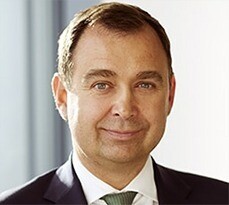Ambition, a diverse skillset and holding your nerve are essential to navigate the “speed bumps” that impede business growth, the CEO of Business Banking at Barclays, Ian Rand, told an audience at an Enterprise Tuesday event at Cambridge Judge Business School.

Numbers of course count in business. But when it comes to obstacles impeding growth, “it’s very rarely about the numbers,” Ian Rand, CEO of Business Banking at Barclays, told those attending the 21 May Enterprise Tuesday talk organised by the Cambridge Judge Entrepreneurship Centre. He was introduced by Hanadi Jabado, Director of Enterprise at Cambridge Judge.
Ian said, “When it comes to growing a business, it’s about ambition, confidence, about having the skills, being willing to pivot at the right time and being willing to hold your nerve at other times.”
Barclays, the largest business bank in England and Wales with circa 1 million UK business customers, teamed up in 2017 with the Entrepreneurship Centre to launch the Barclays Scale Up UK Programme. The programme addresses the scale-up issue afflicting many young companies, or what Ian termed “speed bumps on the road to growth, and how to overcome them.”
Ian, who is a member of the Advisory Board at Cambridge Judge, joined Barclays in 2008 following 12 years in the British Army and eight years with investment bank JP Morgan.
There are three “concentric rings” that need to be addressed in achieving growth: the market a firm operates in, the nature of the business itself, and “you” the individual entrepreneur, Ian told an audience that included many start-up firm founders.
Regarding the market, Ian said that “something weird” happens to many people who start their own business: they “forget how the world is changing” due to a passionate focus on their own company. “Look around you and keep looking at the market,” he advised, because “you may not realise you’re being left behind” by other firms with the same basic concept.
Regarding the business itself, it’s important to either retain an “absolute vision” in the founding idea, like food-delivery business Deliveroo, or be ready to pivot in a completely different direction the way YouTube shifted from an online dating site (its initial slogan was “Tune in, Hook up”) to a video hub – after YouTube realised that its technology was the firm’s key differentiator. “I don’t know if your vision is right,” Ian told the audience, “but what I do know is don’t jump (between two visions). You can maybe get away with that once, but investors would be confused whether they are buying into your vision or not.”
As for company founders, Ian advised entrepreneurs to look after themselves. “Running a business is an incredibly stressful, time-consuming, all-consuming experience: it doesn’t matter what sector you’re in, large or small, it’s tough and it’s emotional, it takes its toll” – including the loneliness of running a business from home.
“Secondly, do a personal skills audit: What is it you are good at that will help you grow your business, and what are you not good at?” Such an exercise can be a “real ego test” for many company founders, because “maybe somebody else needs to lead your pitches because they’re better at it than you are.”
Ian said that many businesses have problems finding staff with the right skills, but sometimes this is actually a diversity issue as well. “Are you attracting the broadest range of talent to join your business, and are you reflecting in your team the diversity of the customers you want to appeal to?”
He also advised that it can be “completely different” for a business to be “investor ready” and “borrower ready”. Investors buy into a company’s vision or team, so it’s crucial to strike an emotional connection; but bankers will follow stricter criteria that require a firm’s demonstrable ability to repay a loan.
“Sometimes the most important thing I can do for a business is to say ‘no – you don’t need a bank, you need investors to be able to enable your business to be lending ready,’” Ian said. Ian’s talk was the finale of the current Enterprise Tuesday series of lectures and networking. The next series starts in November 2019.


